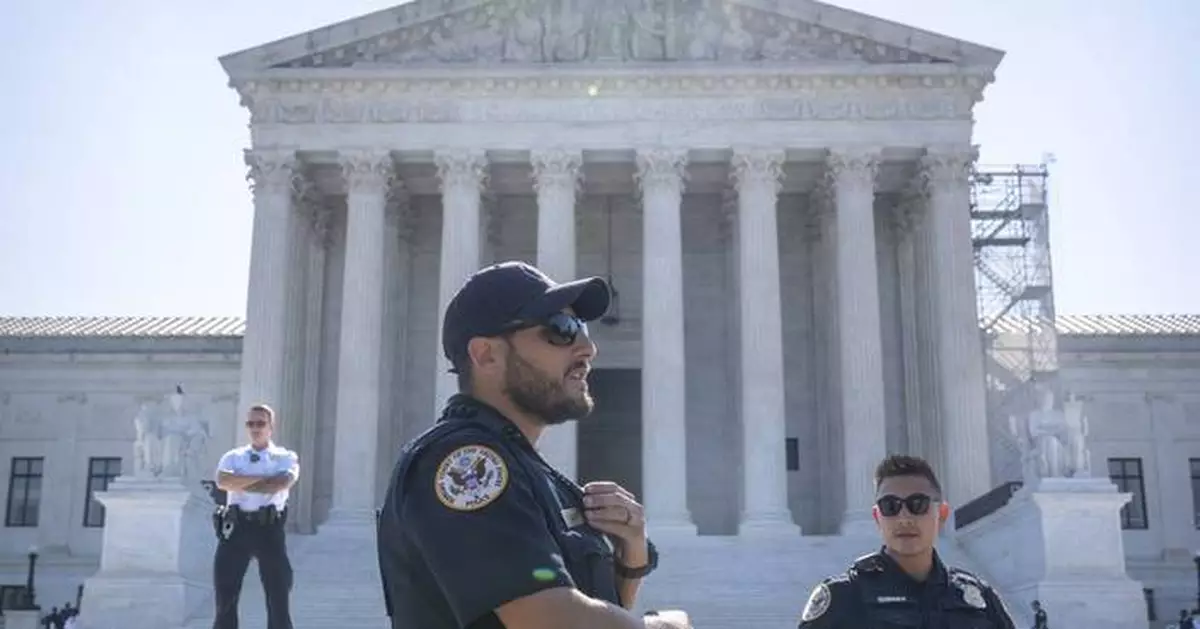WASHINGTON (AP) — The Supreme Court on Thursday made it harder for the federal government to win court orders when it suspects a company of interfering in unionization campaigns in a case that stemmed from a labor dispute with Starbucks.
The justices tightened the standards for when a federal court should issue an order to protect the jobs of workers during a union organizing campaign.
The court unanimously rejected a rule that some courts had applied to orders sought by the National Labor Relations Board in favor of a higher threshold, sought by Starbucks, that must be met in most other fights over court orders, or injunctions.
The NLRB had argued that the National Labor Relations Act, the law that governs the agency, has for more than 75 years allowed courts to grant temporary injunctions if they find requests “just and proper.” The agency said the law doesn’t require it to prove other factors and was intended to limit the role of the courts.
Following the decision, Starbucks said, “Consistent federal standards are important in ensuring that employees know their rights and consistent labor practices are upheld no matter where in the country they work and live.”
But Lynne Fox, president of the union representing the workers, said Starbucks should have dropped the case as part of its more conciliatory attitude toward union organizing efforts. “Working people have so few tools to protect and defend themselves when their employers break the law. That makes today’s ruling by the Supreme Court particularly egregious," said Fox, president of Workers United.
The case began in February 2022, when Starbucks fired seven workers who were trying to unionize their Tennessee store. The NLRB obtained a court order forcing the company to rehire the workers while the case wound its way through the agency’s administrative proceedings. Such proceedings can take up to two years.
A district court judge agreed with the NLRB and issued a temporary injunction ordering Starbucks to rehire the workers in August 2022. After the 6th U.S. Circuit Court of Appeals upheld that ruling, Starbucks appealed to the Supreme Court.
Five of the seven workers are still employed at the Memphis store, while the other two remain involved with the organizing effort, according to Workers United, the union organizing Starbucks workers. The Memphis store voted to unionize in June 2022.
As as the case proceeded, animosity between Workers United and Starbucks began to fade. The two sides announced in February that they would restart talks with the aim of reaching contract agreements this year, and they held their first bargaining session in nearly a year in late April.
Workers at 437 company-owned U.S. Starbucks stores have voted to unionize since late 2021, according to the NLRB, but none of those stores has secured a labor agreement with Starbucks.
Starbucks said it's pursuing its goal reaching ratified contracts for those stores this year.
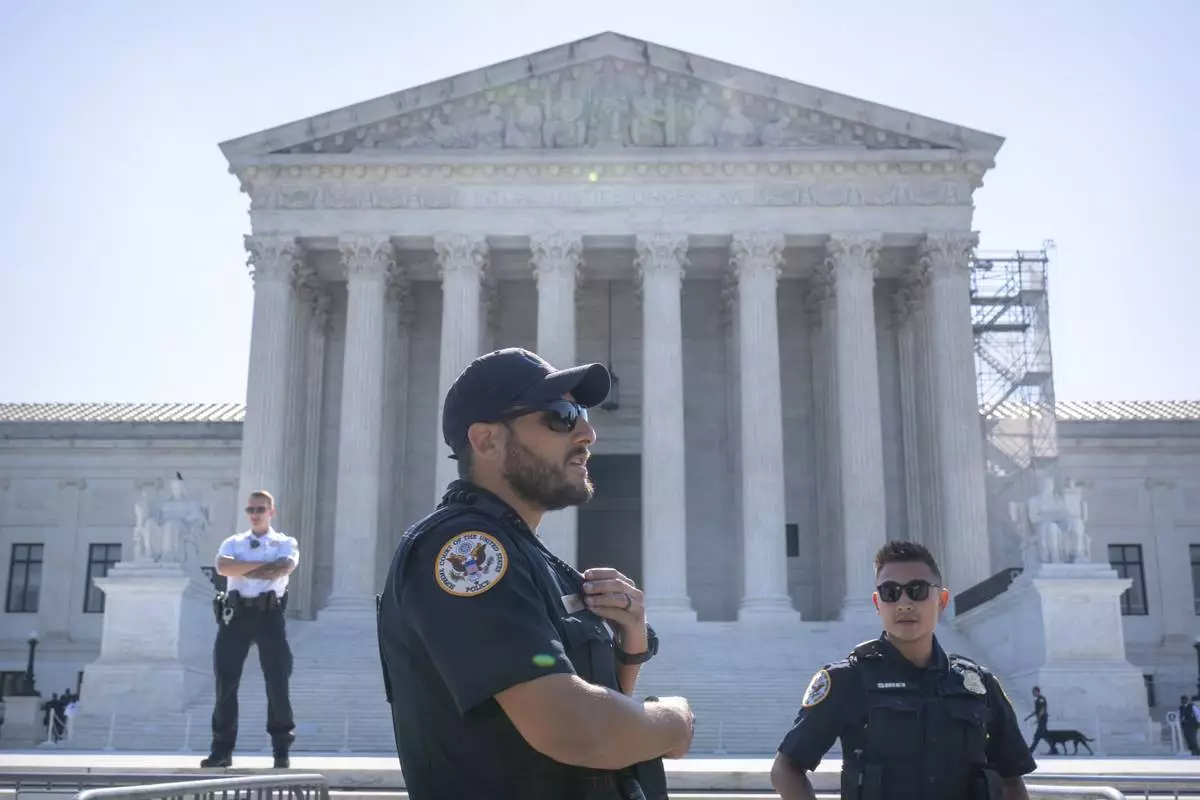
Supreme Court Police officers stand on duty outside of the Supreme Court building on Thursday, June 13, 2024, in Washington. (AP Photo/Mark Schiefelbein)
Beginning Monday, a California law will require credit card networks like Visa and Mastercard to provide banks with special retail codes that can be assigned to gun stores in order to track their sales.
But new laws will do the exact opposite in Georgia, Iowa, Tennessee and Wyoming by banning the use of specific gun shop codes.
The conflicting laws highlight what has quietly emerged as one of the nation's newest gun policy debates, dividing state capitols along familiar partisan lines.
Some Democratic lawmakers and gun-control activists hope the new retail tracking code will help financial institutions flag suspicious gun-related purchases for law enforcement agencies, potentially averting mass shootings and other crimes. Lawmakers in Colorado and New York have followed California's lead.
“The merchant category code is the first step in the banking system saying, `Enough! We’re putting our foot down,'” said Hudson Munoz, executive director of the nonprofit advocacy group Guns Down America. "`You cannot use our system to facilitate gun crimes.’”
But many Republican lawmakers and gun-rights advocates fear the retail code could lead to unwarranted suspicion of gun buyers who have done nothing wrong. Over the past 16 months, 17 states with GOP-led legislatures have passed measures prohibiting a firearms store code or limiting its use.
“We view this as a first step by gun-control supporters to restrict the lawful commerce in firearms,” said Lawrence Keane, senior vice president of the National Shooting Sports Foundation, an industry group that backs laws blocking use of the tracking code.
The new laws add to the wide national divide on gun policy. This past week, U.S. Surgeon General Vivek Murthy declared gun violence a public health crisis, citing a rising number of firearm-related deaths, including more than 48,000 in 2022. The move was quickly criticized by the National Rifle Association.
States have dug opposing trench lines on other gun policies. On July 4, for example, Republican-led Louisiana will become the 29th state to allow residents to carry concealed guns without a permit.
By contrast, Democratic-led New Mexico this year tightened laws for people who don't have concealed-carry permits, requiring a seven-day waiting period for gun purchases, which is more than double the three-day period for a federal background check.
States also have responded differently to recent mass shootings. In Maine, where an Army reservist killed 18 people and wounded 13 others, the Democratic-led Legislature passed a variety of new gun restrictions. Following school shootings in Iowa and Tennessee, the Republican-led legislatures there took steps that could allow more trained teachers to bring guns into classrooms.
The surge of legislation targeting firearm store category codes addresses a behind-the-scenes aspect of electronic financial transactions. The International Organization for Standardization, based in Geneva, sets thousands of voluntary standards for various fields, including category codes for all kinds of businesses, from bakeries to boat dealers to bookstores.
Those category lists are distributed by credit card networks to banks, which assign particular codes to businesses whose accounts they handle. Some credit card issuers use the category codes for customer reward points.
The codes can be used by financial institutions to help identify fraud, money laundering or unusual purchasing patterns that are reported as suspicious activities to the U.S. Treasury Department's Financial Crimes Enforcement Network.
Banks and other depository institutions filed more than 1.8 million confidential reports in 2022 flagging more than 5.1 million suspicious activities. About 4% of annual reports lead to follow-up by law enforcement and an even smaller percentage to prosecution, according to the Bank Policy Institute, a trade group representing large banks.
Stores that sell guns have previously been grouped with other retailers in merchant category codes. Some have been classified as sporting goods stores, others as miscellaneous and specialty retail shops.
At the urging of New York-based Amalgamated Bank, which worked with gun-control groups, the International Organization for Standardization adopted a new four-digit category code for gun and ammunition shops in 2022. Major credit card networks initially said they would implement it but backed off under pressure from conservative politicians and the gun industry.
Munoz, who helped lead the effort to establish the firearms store code, noted credit cards were used to buy weapons and ammunition for some of the nation’s deadliest mass shootings.
The intent of a gun merchant code is to spot suspicious patterns, like a person with little history of gun purchases who suddenly spends large amounts at multiple gun stores in a short period. Once alerted by banks, authorities could investigate, potentially thwarting a mass shooting, Munoz said.
California's new law requires credit card networks to make the firearms code available to banks and other financial institutions by Monday. Those entities then have several months to determine which of their business clients should be categorized as gun stores and assign them new codes by May 1.
Visa, the nation's largest payment network, recently updated its merchant data manual to add the firearms code to comply with California's law.
Democratic-led legislatures in Colorado and New York this year also passed firearms code mandates aligned to kick in with California's next May.
“If there was someone suspiciously purchasing a large number of firearms, right now it would be very difficult to tell," said California state Assemblymember Phil Ting, a Democrat who sponsored the new law. “You couldn’t tell if they were soccer balls or golf balls or basketballs."
Even with a firearms store code, it won't be possible to know whether a particular sale is for a rifle, storage safe or some other product such as hunting apparel.
The state laws prohibiting gun store codes have varying effective dates but typically allow state attorneys general to seek court injunctions against financial institutions using the codes, with potential fines reaching thousands of dollars.
The merchant code could lead more people to buy guns with cash instead of credit in order to protect their privacy, said Dan Eldridge, owner of Maxon Shooter’s Supplies in suburban Chicago. Though his business has yet to be recategorized, Eldridge said he already has placed an ATM in his store.
“Viewed most benignly, this code is an effort to stigmatize gun owners," Eldridge said. "But a more worrisome concern is that this is another private sector end run around the prohibition against the federal government creating a gun registry.”
Iowa state Sen. Jason Schultz, a Republican sponsor of legislation banning the firearms code, said he feared federal agents could gain access to data about gun store purchases from financial institutions, then use that as justification to raid gun owners' homes and infringe on their Second Amendment rights.
“States are going to have to make a choice," he said, "whether they want to follow California or whether they’d like to support the original intent of the U.S. Constitution.”
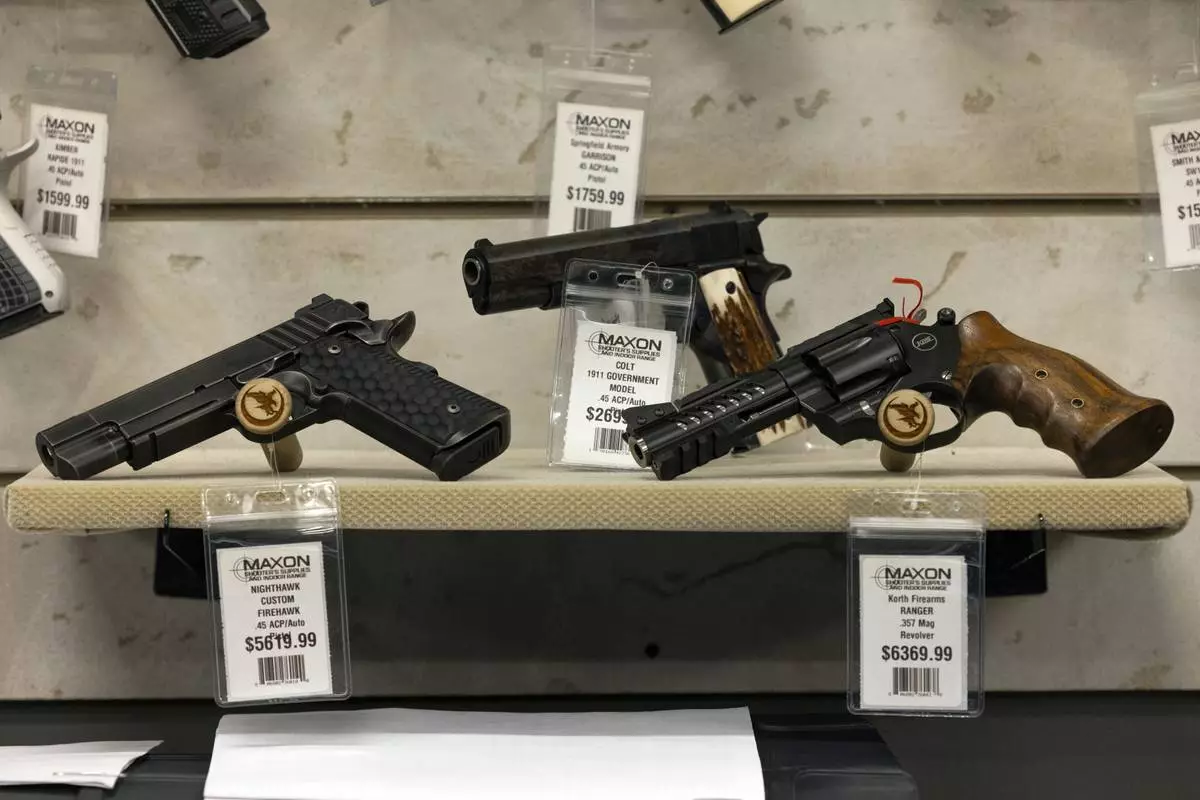
Guns for sale are displayed at Maxon Shooter's Supplies in Des Plaines, Ill., Tuesday, June 25, 2024. A new national divide is emerging among states over whether to track sales by gun stores. A California law taking effect Monday will require credit card networks to provide banks with special retail codes to assign to gun stores. By contrast, new laws taking effect in Georgia, Iowa, Tennessee and Wyoming will prohibit the use of special gun shop codes in financial transactions. A total of 17 states have passed some sort of limit on category codes for gun retailers, while California has been joined by Colorado and New York. (AP Photo/Teresa Crawford)
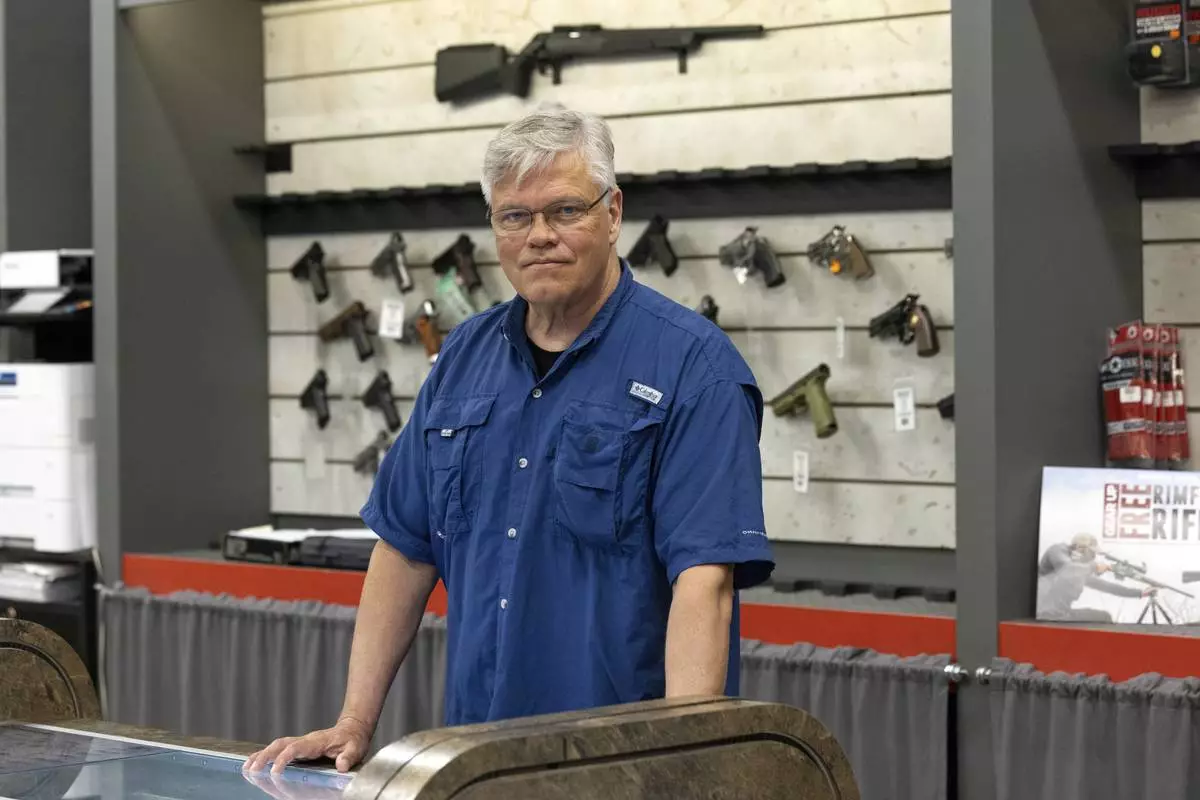
Maxon Shooter's Supplies owner Dan Eldridge poses in his store in Des Plaines, Ill., Tuesday, June 25, 2024. A new national divide is emerging among states over whether to track sales by gun stores. A California law taking effect Monday will require credit card networks to provide banks with special retail codes to assign to gun stores. By contrast, new laws taking effect in Georgia, Iowa, Tennessee and Wyoming will prohibit the use of special gun shop codes in financial transactions. A total of 17 states have passed some sort of limit on category codes for gun retailers, while California has been joined by Colorado and New York. (AP Photo/Teresa Crawford)
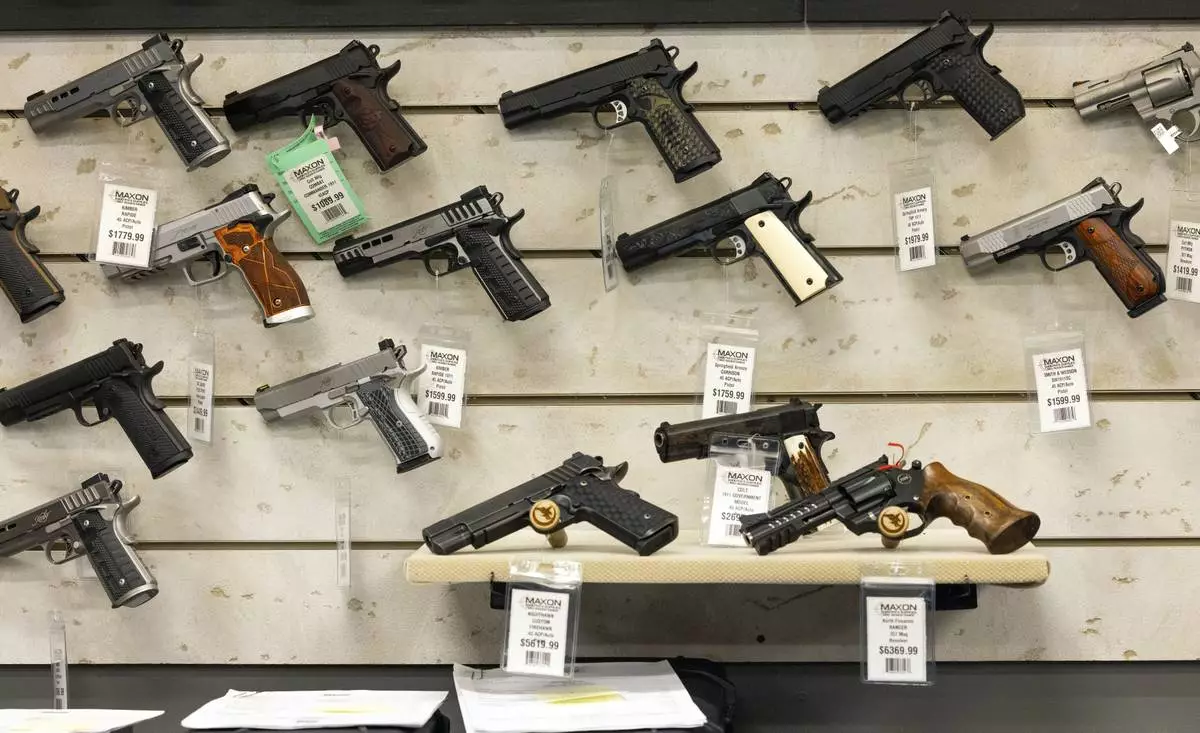
Guns for sale are displayed at Maxon Shooter's Supplies in Des Plaines, Ill., Tuesday, June 25, 2024. A new national divide is emerging among states over whether to track sales by gun stores. A California law taking effect Monday will require credit card networks to provide banks with special retail codes to assign to gun stores. By contrast, new laws taking effect in Georgia, Iowa, Tennessee and Wyoming will prohibit the use of special gun shop codes in financial transactions. A total of 17 states have passed some sort of limit on category codes for gun retailers, while California has been joined by Colorado and New York. (AP Photo/Teresa Crawford)
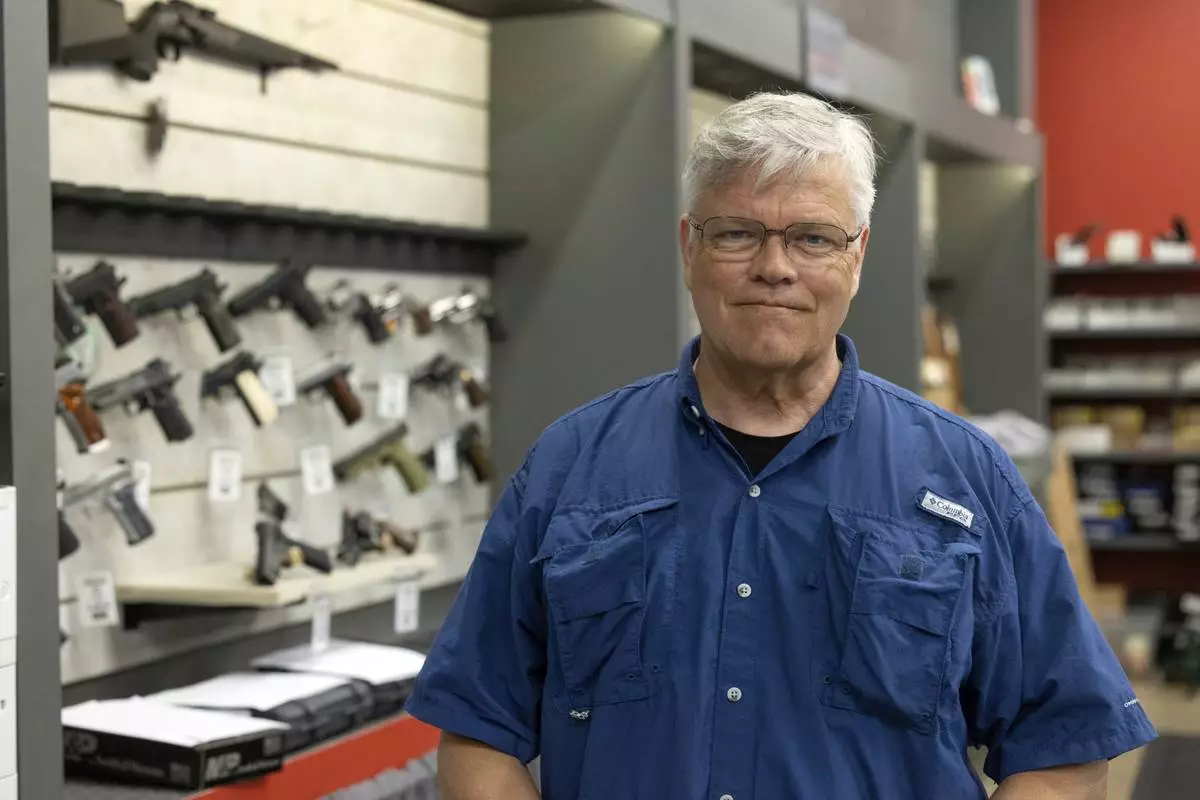
Maxon Shooter's Supplies owner Dan Eldridge poses in his store in Des Plaines, Ill., Tuesday, June 25, 2024. A new national divide is emerging among states over whether to track sales by gun stores. A California law taking effect Monday will require credit card networks to provide banks with special retail codes to assign to gun stores. By contrast, new laws taking effect in Georgia, Iowa, Tennessee and Wyoming will prohibit the use of special gun shop codes in financial transactions. A total of 17 states have passed some sort of limit on category codes for gun retailers, while California has been joined by Colorado and New York. (AP Photo/Teresa Crawford)



